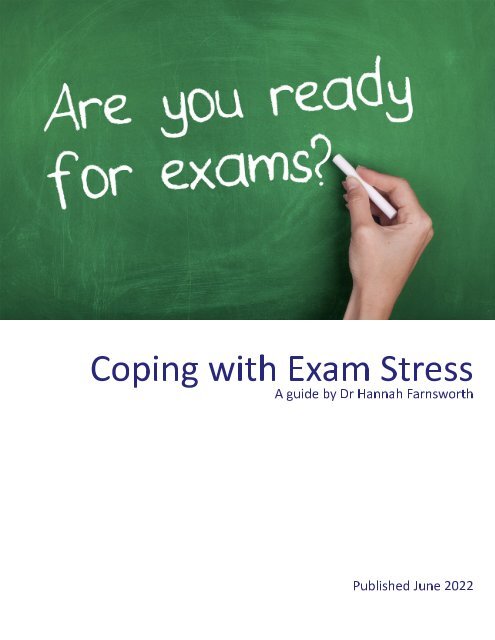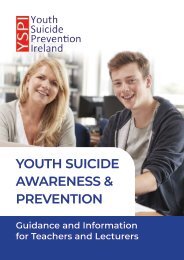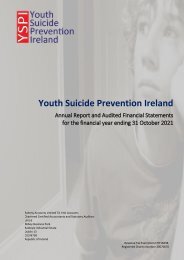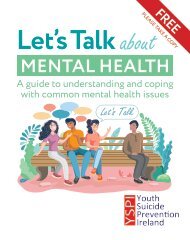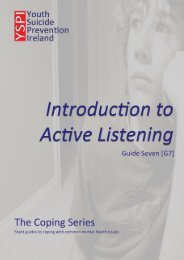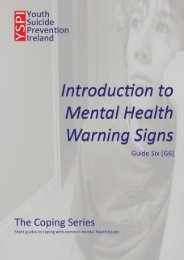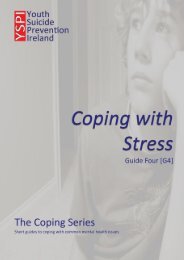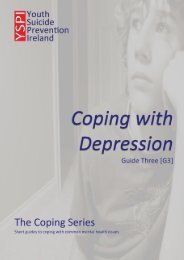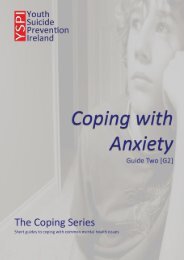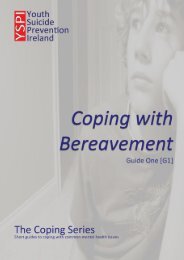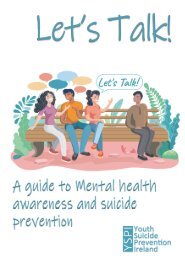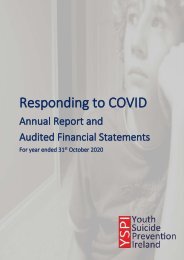Coping with Exam Stress
A new guide to coping with Exam Stress including how to recognise the signs of stress and the latest techniques to reduce stress, and much more. The guide is written by Dr Hannah Farnsworth and contains information for students, friends of students and parents.
A new guide to coping with Exam Stress including how to recognise the signs of stress and the latest techniques to reduce stress, and much more. The guide is written by Dr Hannah Farnsworth and contains information for students, friends of students and parents.
You also want an ePaper? Increase the reach of your titles
YUMPU automatically turns print PDFs into web optimized ePapers that Google loves.
<strong>Coping</strong><strong>with</strong><strong>Exam</strong> Stres<br />
AguidebyDrHannahFarnsworth<br />
PublishedJune2022
<strong>Coping</strong> <strong>with</strong> <strong>Exam</strong> <strong>Stress</strong><br />
by Dr Hannah Farnsworth<br />
It is normal to feel a bit worried when you have exams coming up. You might become<br />
anxious that you won’t get the grades you want, or worried that you don’t have much time<br />
left to revise. Some people also feel pressure from parents, other family members, or their<br />
school to do well.<br />
Whether you are approaching your Junior Certificate or Leaving Certificate, the lead up to<br />
exams can feel very stressful. In this article, we will look at the causes of exam stress, as well<br />
as exploring what you can do to ensure that exam pressure doesn’t start to make you feel<br />
unwell.<br />
What is <strong>Exam</strong> <strong>Stress</strong>?<br />
<strong>Exam</strong> stress occurs when you feel worried, anxious, tense or unhappy at the thought of<br />
sitting a test or exam. Irish students sitting their Junior Certificate or Leaving Certificate may<br />
feel particularly stressed in the lead up to the exam period each year, as many examinations<br />
need to be prepared for and then taken.<br />
<strong>Exam</strong> stress may feel particularly intense this year following the cancellation of exams<br />
during the Covid-19 pandemic. The impact of the pandemic has meant that some students<br />
have had less experience of exams, which may lead to heightened anxiety this year.<br />
It is common to feel a bit worried before you sit your exams. You might feel particularly<br />
nervous if:<br />
<br />
<br />
<br />
<br />
<br />
You need to achieve a grade to get onto your next course, into university, or for a<br />
certain job<br />
You haven’t worked as hard as you might have liked to<br />
You feel pressure to succeed from your teachers, parents or friends<br />
You spend a lot of time comparing yourself to others<br />
You feel you have a lot to lose if your exams don’t go very well.<br />
How Do I Know If I’m <strong>Stress</strong>ed About My <strong>Exam</strong>s?<br />
<strong>Exam</strong> stress can feel similar to nervousness or anxiety. <strong>Stress</strong> can be a type of fear, and it is<br />
normal to feel a bit fearful or anxious before sitting important exams.<br />
For many students, the anxiety will be mild and not too bothersome. In some cases, feeling<br />
a bit worried or nervous can actually be helpful. This is because the anxiety acts as a form of<br />
encouragement to get some revision done prior to the exam period.<br />
However, for some people, exam stress can become overwhelming, causing severe anxiety<br />
and even unhappiness. In this situation, the anxiety will not help you to prepare for your<br />
exams, and could instead make it feel even harder to revise or study.<br />
Page 1 © Dr Hannah Farnsworth & YSPI Publications Ltd 2022
<strong>Coping</strong> <strong>with</strong> <strong>Exam</strong> <strong>Stress</strong><br />
If you notice anxiety, depression or difficulty sleeping prior to sitting your exams, you may<br />
be suffering from exam stress.<br />
Anxiety<br />
Feeling anxious or worried about your exams can cause a range of emotional and physical<br />
symptoms. You may notice that you:<br />
<br />
<br />
<br />
<br />
<br />
<br />
<br />
<br />
<br />
<br />
<br />
<br />
<br />
<br />
Feel dizzy<br />
Feel sick or get butterflies in your stomach<br />
Get more headaches than usual<br />
Feel your heart racing or pounding<br />
Have shallow or rapid breathing<br />
Shake or have a tremor in your hands<br />
Have aches or pains in your muscles or joints<br />
Feel stressed, nervous, or panicky<br />
Are grumpy, irritable, or lash out at friends or family<br />
Feel tired or exhausted<br />
Have difficulty concentrating at school or when trying to revise<br />
Are constantly thinking about your exams or revision<br />
Have a sense of dread or feel sure that something awful is going to happen<br />
Feel like you can’t cope.<br />
Depression<br />
Sometimes, feeling stressed about your exams can alter your mood. Feeling sad, low or<br />
depressed can be a sign of exam stress in teenagers. You may notice that you:<br />
<br />
<br />
<br />
<br />
<br />
<br />
<br />
<br />
<br />
<br />
<br />
Feel sad or have a low mood that won’t go away<br />
Feel irritable or grumpy<br />
Don’t want to do any of the things you used to enjoy, such as clubs, activities, seeing<br />
friends, gaming or reading<br />
Feel tired or exhausted no matter how much sleep you get<br />
Can’t concentrate on school work or revision<br />
Can’t relax<br />
Eat more or less than usual<br />
Gain or lose weight<br />
Feel worthless or useless<br />
Feel numb<br />
Have thoughts about hurting yourself, or about suicide.<br />
Difficulty Sleeping<br />
When people are stressed about exams, or worried for any other reason, it can affect their<br />
sleep patterns. If you are struggling to fall asleep, waking up too early in the morning, or<br />
waking up frequently throughout the night, exam stress could be affecting your sleep<br />
patterns. You may find that you feel very tired each day, but still can’t fall asleep at bedtime.<br />
Page 2 © Dr Hannah Farnsworth & YSPI Publications Ltd 2022
<strong>Coping</strong> <strong>with</strong> <strong>Exam</strong> <strong>Stress</strong><br />
If you recognise any of these symptoms and feel that exam stress might be taking over your<br />
life, there are several steps you can take to get better control of your worries so that they<br />
have less impact on you.<br />
How Can I Reduce <strong>Exam</strong> <strong>Stress</strong>?<br />
If you want to reduce the impact exam stress if having on you, the first thing to remember is<br />
that you are not alone. Many of your friends will also be feeling nervous or worried, even if<br />
they do not show it. Sitting your Junior Certificate and Leaving Certificate exams are a big<br />
part of your life, and it is normal to have some anxiety at this time. However, if your worries<br />
feel intense, are making you feel unwell, or are impacting other parts of your life, then there<br />
are ways to start managing the way you feel.<br />
Speak To Friends or Family<br />
If revision or the thought of sitting exams is making you feel stressed, chat <strong>with</strong> your friends<br />
or family about how you feel. Keeping everything inside you might make you feel worse, as<br />
there is no outlet for your feelings. Being honest about your worries can help to make<br />
anxiety feel less intense, and having the support or friends and family can make you feel<br />
much better.<br />
Ask for Help<br />
If you don’t feel able to chat to friends or family about exam stress, you could instead speak<br />
<strong>with</strong> a teacher or tutor that you get on well <strong>with</strong>. Alternatively, ask to speak to your school<br />
counsellor.<br />
Make a Revision Timetable<br />
Making a plan can help your revision process feel less stressful. Write a list of all the subjects<br />
or exams you need to revise for, and then use a calendar to ensure you allocate enough<br />
time for revision of each subject before the exam date.<br />
Try not to put your revision off, and stick to your timetable where possible. Doing at least<br />
some work each day will soon start to make a difference to how confident you feel about<br />
your exams. It is also very satisfying to be able to tick items off once you have revised them.<br />
Tracking your revision may help you feel pleased <strong>with</strong> your progress and less worried about<br />
how much you have left to do.<br />
Make a Study Group<br />
If you find it hard to motivate yourself to work on your own, you could start your own study<br />
group. You and your group will need to be strict about not getting distracted, <strong>with</strong> all of you<br />
committed to focusing on getting your revision done. It can be helpful to create a list of<br />
topics that you all want to cover so that the study group has a clear purpose. For example,<br />
you could each take responsibility for teaching the rest of the group one topic. Working in<br />
this way can make you feel less alone and help to boost your confidence.<br />
Make Time for Self Care<br />
It is important to make time for your own mental health during exam periods. If you are<br />
stressed about your exams, you may feel like you need to spend every spare second<br />
Page 3 © Dr Hannah Farnsworth & YSPI Publications Ltd 2022
<strong>Coping</strong> <strong>with</strong> <strong>Exam</strong> <strong>Stress</strong><br />
revising, but working such long hours can have a negative impact on your emotional<br />
wellbeing.<br />
Even when you are in the midst of revision, it is important to make sure you are eating well<br />
and sticking to a regular bedtime and wake up time. Making time to see your friends,<br />
watching TV, and listening to music are all really important for helping to reduce stress<br />
levels as you approach your exams. Some teenagers also like to follow guided meditations<br />
or write in a journal to help them unwind during the exam period.<br />
Make sure you have a treat each day as a reward for working hard at your revision. This<br />
does not need to cost anything, and could include watching your favourite TV show or<br />
meeting up <strong>with</strong> a friend.<br />
Exercise<br />
Exercise and physical activity are known to improve the mood. If you are feeling stressed or<br />
anxious, going for a walk, cycle or jog will not only improve your physical health but also<br />
help to boost your emotional health. Getting out to do some exercise can also help to put<br />
things in perspective, which may make your revision feel more manageable afterwards.<br />
Eat Healthily<br />
Although it can be tempting to snack on biscuits or eat ready meals while you are revising,<br />
try to ensure you are eating well. Eating a balanced diet including fruit and vegetables will<br />
help you to feel as healthy as possible before your exams.<br />
Prioritise Sleep<br />
Things tend to feel worse when we are tired, so prioritise going to bed at a reasonable time<br />
each night. Most teenagers need around 8 to 10 hours sleep per night, so you will need to<br />
go to bed around 10pm to ensure you are ready to get up at 7am or 8am the following day.<br />
If you get into the habit of staying up late and sleeping in, you are likely to feel more tired<br />
and therefore find it difficult to concentrate on your studies.<br />
See Your Doctor<br />
If exam stress is making you feel unwell or you are worried about the symptoms of anxiety<br />
or depression, you should speak to your doctor for advice.<br />
Remember Perspective<br />
<strong>Exam</strong>s are important, but they do not define your success. Many famous people did not do<br />
well at school, but have still gone on to be successful. Trying your best is important, and this<br />
includes making time for revision to give yourself the best chance when sitting your exams.<br />
However, if things don’t go well on the day or you are disappointed <strong>with</strong> your results, there<br />
will be other opportunities or options that you can explore.<br />
Page 4 © Dr Hannah Farnsworth & YSPI Publications Ltd 2022
<strong>Coping</strong> <strong>with</strong> <strong>Exam</strong> <strong>Stress</strong><br />
I have a friend who might be stressed about exams. What can I do to help them?<br />
During exam periods, you may see that some of your friends or classmates seem stressed or<br />
anxious. If you are also sitting your exams, it is important that you have the time you need<br />
to focus on your own preparations. However, there may be some things you can do to help<br />
a friend who is struggling, too.<br />
Talk to Them<br />
<strong>Exam</strong> stress can feel different to everyone, so ask your friend how they are feeling and what<br />
you can do to help. They might simply need someone to listen to their worries.<br />
Study Together<br />
If possible, you could offer to be a study partner for your friend. You do not have to be<br />
taking the same subjects to be study partners, as it could involve meeting at one of your<br />
houses, at school, or in a library to work alongside each other on your different subjects.<br />
Putting a study timetable together may help you both feel more dedicated and motivated to<br />
get your revision done.<br />
Know Their Schedule<br />
Take a photo of your friend’s exam schedule, and send a text before each exam wishing<br />
them good luck. Kind and thoughtful gestures like these can go a long way to making<br />
someone feel more confident about an exam.<br />
Ask About Their <strong>Exam</strong>s<br />
After your friend has sat an exam, ask them how it went. Some people find it helpful to talk<br />
about the paper they have just sat, as it is a way of processing feelings and experiences.<br />
Socialise Together<br />
Supporting a friend can also involve self-care for both of you. Meet up for a walk or watch<br />
TV together, and take a break from studying to look after your emotional health.<br />
Look After Yourself<br />
Although you want to help your friend, this must not be at the expense of your own mental<br />
wellbeing, education or revision. If it feels that your friend is asking too much of you, it is ok<br />
to take a step back and explain that you need to focus on your schoolwork, too. You can<br />
recommend that your friend speaks to their parents, teachers or another trusted adult if<br />
they need more support.<br />
Page 5 © Dr Hannah Farnsworth & YSPI Publications Ltd 2022
<strong>Coping</strong> <strong>with</strong> <strong>Exam</strong> <strong>Stress</strong><br />
I think my child is stressed about their exams, what can I do to support them?<br />
If you think your child is stressed about their exams, you may have noticed that they:<br />
<br />
<br />
<br />
<br />
<br />
<br />
<br />
<br />
<br />
Seem anxious<br />
Are irritable or appear to be tense<br />
Have a low mood or negative state of mind<br />
Are not sleeping very well<br />
Are eating more or less than usual<br />
Have gained or lost weight<br />
No longer want to do the activities they used to enjoy<br />
Have been complaining of headaches or stomach pains<br />
Seem to be indifferent about their future.<br />
As a parent, you can support your child <strong>with</strong> their exam stress in the following ways.<br />
Offer Unconditional Support<br />
Many children fear letting their parents down <strong>with</strong> their exam results. Even if you have not<br />
set high expectations or been ‘pushy’, a child might worry about what you will think of their<br />
grades. Telling your child that you love them and will be proud of them regardless of their<br />
results can therefore help to alleviate anxiety.<br />
Let your child know that it is normal to feel nervous before exams, and encourage them by<br />
talking about how any practice exams have gone.<br />
Encourage Healthy Eating<br />
A child’s mood can be worsened by eating sugary, fatty or caffeinated foods and drinks.<br />
Offering healthy meals and snacks may help your child feel better in themselves.<br />
Encourage Exercise<br />
Simple exercise such as walking, swimming or cycling can help to lift the mood. It is not<br />
healthy to revise for hours on end <strong>with</strong>out a break, so encourage your teen to fit some<br />
physical activity into the day to benefit their physical and mental health.<br />
Encourage a Sleep Pattern<br />
Sleep patterns can be impacted by exam stress. Recommending a regular bedtime and<br />
setting an alarm to get up each morning can improve the quality of sleep your child gets,<br />
helping them to feel more focused on their studies each day.<br />
Stay Calm<br />
A child who is stressed can feel more difficult to be around. Try to remember that once the<br />
exams are over, your child is likely to become easier again. Stay calm during the exam<br />
phase, and try to avoid arguments.<br />
When revising, your child may find it difficult to keep up <strong>with</strong> the household chores they<br />
usually complete. Try to stay calm if your child’s bedroom is messy, or if they are no longer<br />
Page 6 © Dr Hannah Farnsworth & YSPI Publications Ltd 2022
<strong>Coping</strong> <strong>with</strong> <strong>Exam</strong> <strong>Stress</strong><br />
helping <strong>with</strong> chores. The exam period will end and then you can ask them to provide more<br />
help around the house.<br />
Provide a Study Space<br />
Having somewhere to work can make revision feel less stressful. A desk, a corner of the<br />
dining table, or a section of the kitchen worktop will give your child somewhere comfortable<br />
to concentrate.<br />
Practical Suggestions<br />
Creating a timetable of study will help your child focus on what they need to revise each<br />
day. Sit down together to work out what they need to focus on over the next few weeks.<br />
Request past papers from the school to give your child chance to practice their exam<br />
technique.<br />
If your child is worried about the exam conditions, ask for them to visit the exam hall so they<br />
know what to expect on the day.<br />
On the day of an exam, wish your child good luck and be supportive. Avoid criticism or<br />
negativity. If they are worried, make sure they know that there is more to life than exams,<br />
and even if these exams do not go as well as they would like, there will be other<br />
opportunities in life. Offer simple, inexpensive treats after their exam, such as cooking their<br />
favourite meal or watching TV together.<br />
Get Help if Needed<br />
If you are worried about your child’s mental health, you may need to speak to a doctor. This<br />
is particularly important if you are worried about persistent anxiety or a low mood that does<br />
not show signs of lifting.<br />
Page 7 © Dr Hannah Farnsworth & YSPI Publications Ltd 2022


